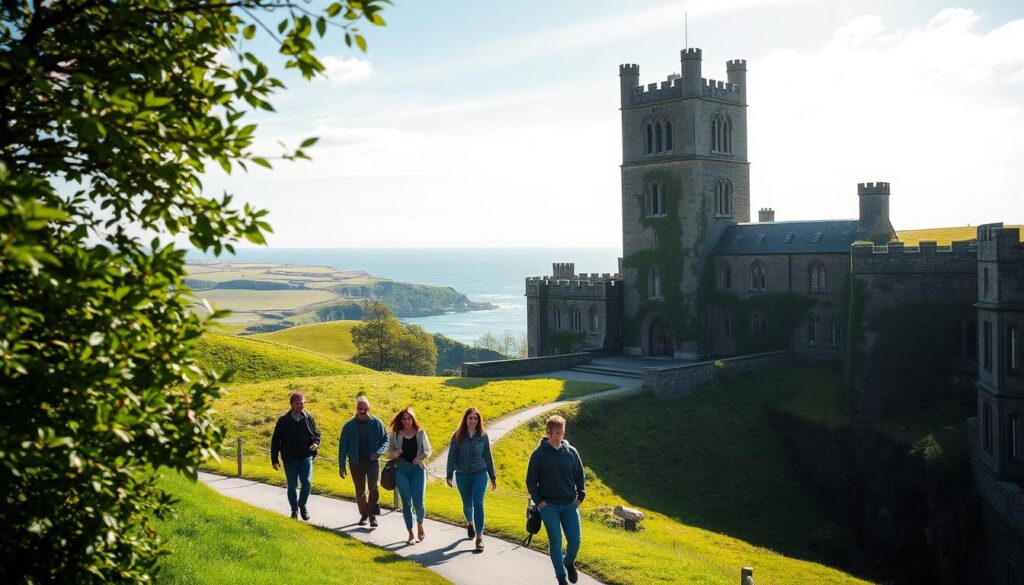Three years ago, I stood at a crossroads. The world felt vast, yet one place kept calling me—a land of emerald hills, warm smiles, and world-class education. Today, as I walk through Trinity College Dublin’s historic campus, I realize how this decision reshaped my future.
What drew me study in ireland? Ireland’s #3 ranking on the Global Peace Index promised safety. Its 0.950 Human Development Index score signaled unmatched quality of life. But it was the energy—the blend of cutting-edge research and ancient storytelling traditions—that truly captivated me.
Imagine attending lectures where innovation thrives, then exploring cobblestone streets alive with music. That’s daily life here. Over 35,000 international students choose Ireland yearly, and it’s easy to see why. From tech giants like Google nesting in Dublin to universities pushing sustainability frontiers, opportunities feel limitless.
As someone from Mumbai, I worried about fitting in. Yet Ireland’s English-speaking environment erased language barriers. Locals greeted my questions with patience, turning strangers into friends. Now, when I sip tea at a cozy café near College Dublin, I’m home.
If you’re dreaming of growth—academic, cultural, or personal—this might be your place too. Let’s explore what makes study Ireland journeys unforgettable.
My Life-Changing Journey: Why I Chose Ireland
I never imagined a library could feel like home until I stepped into Trinity College Dublin’s Long Room. The scent of ancient books mixed with student laughter created magic. My decision came down to three things: community support, cultural richness, and a learning environment that sparks curiosity.
Personal Motivations
Growing up in Mumbai, I craved education that blended theory with real-world impact. Ireland’s universities stood out for their:
- Mentorship programs pairing students with industry leaders
- 24/7 international student helplines
- Career fairs featuring Fortune 500 companies
What sealed the deal? A Zoom call with alumni who said, “Here, you’re not just a student ID number.”
Initial Impressions of Ireland
Dublin Airport’s Arrivals Hall surprised me. A volunteer group greeted newcomers with free SIM cards and city maps. Within hours, I discovered:
| Tradition | Modernity | Student Perks |
|---|---|---|
| Pub storytelling nights | Google’s European HQ | Free museum access |
| Celtic music festivals | AI research labs | Discounted transit passes |
| Weekly farmers’ markets | Startup incubators | On-campus global cafes |
Trinity’s orientation week felt like a festival. Seniors organized Gaelic football matches between lectures. Professors remembered my name by day three. This wasn’t just studying – it was belonging.
Study in Ireland: Benefits and Opportunities
Ireland’s education system shines brighter than a Dublin pub window at dusk. During my first week here, a professor casually mentioned, “We don’t just teach subjects—we build problem-solvers.” That philosophy permeates every classroom and internship opportunity.
Academic Excellence and Global Rankings
Three Irish universities rank in the world’s top 200, but numbers only tell half the story. What impressed me most was how courses blend lectures with hands-on projects. My friend from Chennai now codes alongside engineers at Apple’s Cork campus—a routine perk of her computer science course.
| Strength | Global Impact | Student Advantage |
|---|---|---|
| Research funding | Top 10 for nanotechnology | Lab access from year one |
| Faculty expertise | Nobel laureates teaching | Mentorship programs |
| Industry partnerships | 1,200+ tech HQs in Dublin | Guaranteed internships |
Industry Connections and Economic Stability
Ireland’s economy grew 9.4% last year—faster than any EU country. This stability creates a safety net for graduates. When I mentioned my finance studies at a Dublin networking event, three accounting firms requested my CV. English as the primary language removes communication hurdles, letting you focus on career growth.
Between multinational job fairs and startup incubators, opportunities feel endless. As my Cork-based mentor says, “Here, your degree isn’t a certificate—it’s a launchpad.”
World-Class Education and Renowned Universities
Walking through Trinity’s Front Arch for the first time, I felt history and innovation collide. Ireland’s universities don’t just teach—they inspire. The QS World University Rankings confirm this, with three institutions consistently ranking among the globe’s top 200. What makes them stand out? Let me show you through my own lens.
Trinity College Dublin and Leading Institutions
During my first week at Trinity, I attended a robotics lecture in a 18th-century building equipped with 3D printers. That’s Irish education—respecting heritage while chasing tomorrow. The university’s partnerships with MIT and Google create unique research pipelines. But it’s not alone:
| University | QS Rank | Signature Strength |
|---|---|---|
| Trinity College Dublin | 81 | Literature & AI Research |
| University College Dublin | 171 | Agri-Tech Innovations |
| University College Cork | 303 | Renewable Energy Systems |
My professor once said, “We’re training minds to solve global challenges, not just pass exams.” This ethos permeates every lab and lecture hall.
Diverse Academic Programs for Global Students
From sustainable finance to Celtic archaeology, Irish universities offer 500+ programs taught in English. I’ve shared classrooms with students from 26 countries, each bringing unique perspectives. The curriculum constantly evolves—last semester, we debated AI ethics with engineers from Intel’s Dublin campus.
Three features make these programs world-class:
- Micro-credentials in emerging fields like carbon accounting
- Mandatory industry placements with LinkedIn profiles
- Interdisciplinary projects tackling UN Sustainable Goals
When I presented my climate change model at a global conference, it wasn’t just my work—it was Ireland’s educational ecosystem shining through.
Research, Courses, and Scholarship Options
Choosing courses here felt like navigating a treasure map—every path led to exciting discoveries. Irish universities blend academic rigor with real-world relevance, creating programs that employers globally recognize. Let me guide you through the opportunities that transformed my journey.
Popular Courses for International Students
During orientation week, I met peers from Mumbai to Montreal all chasing similar dreams. These programs dominate wish lists for good reason:
| Course | Focus Area | Career Outcomes |
|---|---|---|
| Data Science | AI Ethics & Machine Learning | €58K avg starting salary |
| Renewable Energy | Wind Farm Technology | 90% placement rate |
| International Business | EU Market Strategies | Dublin startup partnerships |
My friend from Pune landed a Tesla internship through Trinity College’s innovation hub. “They teach you to think three steps ahead,” she told me after her first project presentation.
Scholarship Programs and Financial Aid
Funding made my dream possible. The Government of Ireland Scholarship covers €10,000 plus full tuition—but that’s just one option:
| Program | Amount | Perks |
|---|---|---|
| Trinity Academic Excellence | €5,000/yr | Research travel grants |
| STEM Women Leadership | Full tuition | Mentorship + networking |
| Global Citizen Award | €7,500 | Visa fee coverage |
Application deadlines matter—mark your calendar for January 15th. When my scholarship letter arrived, I cried happy tears. That support let me focus on studies instead of bills.
Pro tip: Combine scholarships with part-time campus jobs. Many friends fund living costs this way while gaining work experience. With proper planning, studying here becomes an achievable leap toward your brightest future.
Navigating Admissions, Visa, and Application Processes
The moment I clicked “submit” on my application, my hands shook. Admissions processes feel like solving a puzzle—until you learn where the pieces fit. Let me simplify what I wish I’d known earlier.
Admission Requirements Made Manageable
Irish universities want clarity, not perfection. My Mumbai counselor advised focusing on three essentials:
- Academic transcripts with official stamps
- Purpose-driven personal statements
- Two recommendation letters showing growth
I missed my IELTS deadline once. A university services team helped me reschedule within days. Pro tip: Start document checks 8 weeks early. Many friends used free portal tools to track submission statuses.
Visa Victory Blueprint
My visa interview lasted 7 minutes. The officer cared most about:
| Document | Purpose | Common Errors |
|---|---|---|
| Bank statements | Proof of funds | Missing 6-month history |
| Acceptance letter | Course confirmation | Expired validity dates |
| Medical insurance | Health coverage | Inadequate €35,000 coverage |
An immigration advisor told me, “Treat your visa file like a storybook—every page should connect.” I printed color-coded folders after three rejection scares. Now, I help peers avoid similar stress through campus workshops.
These steps unlock career opportunities in a country that values preparedness. When you organize early, you’re not just applying—you’re building professional muscles for future success.
Cost of Tuition and Living: Financial Planning for Students

My first month here taught me more about money management than any finance class. Balancing tuition fees with living costs felt daunting until I discovered smart budgeting strategies. Let me share the financial blueprint that keeps my bank account – and dreams – intact.
Tuition Fee Breakdown by Program
Course costs vary like Dublin’s weather. Humanities programs often start at €10,000 yearly, while technology and engineering degrees can reach €25,000. Check this comparison from leading institutions:
| Program | University College Dublin | Other Cities |
|---|---|---|
| Computer Science | €24,500 | €18,000-€22,000 |
| Business Management | €19,800 | €14,500-€17,000 |
| Environmental Science | €21,200 | €16,000-€19,500 |
Monthly Living Expenses and Budgeting
Dublin surprised me with €1,200 monthly costs, but Galway friends spend €850. Here’s how expenses stack up:
| City | Accommodation | Food | Transport |
|---|---|---|---|
| Dublin | €600-€800 | €250 | €60 |
| Cork | €400-€550 | €200 | €45 |
| Galway | €350-€500 | €180 | €35 |
Three budgeting lifesavers:
- Shared housing cuts rent by 40%
- Student Leap Cards offer 50% transit discounts
- Weekly meal prep saves €100 monthly
A classmate from Pune works 20 hours weekly at a tech startup. “Part-time jobs cover my groceries and weekend adventures,” she says. With careful planning, study abroad becomes financially achievable – even today.
Career Prospects and Post-Study Work Opportunities
The moment I received my first job offer in Dublin, I realized how Irish higher education bridges academia and industry. With 90% of graduates employed within six months, this island transforms classroom knowledge into global careers.
Thriving Sectors for Graduates
Ireland hosts 9 of the world’s top 10 tech firms and 15 leading pharma companies. During my internship at Pfizer’s Cork facility, I witnessed cutting-edge vaccine research firsthand. Three sectors dominate graduate placements:
| Sector | Growth Rate | Key Employers |
|---|---|---|
| Technology | 14% annually | Google, Microsoft |
| Pharmaceuticals | €65B exports | Pfizer, Johnson & Johnson |
| Financial Services | 6.8% expansion | Bank of America, Citibank |
My University College Dublin mentor connected me with Dublin’s startup ecosystem. “Courses here mirror industry needs,” she noted during our final project review.
Post-Study Work Visa and Employment Benefits
The Third Level Graduate Scheme grants 24 months’ work authorization—Europe’s most generous post-study visa. I secured mine in 3 weeks through a streamlined portal. Key advantages:
- Full-time employment rights without sponsorship
- Pathway to permanent residency after 2 years
- Family reunification options
As a financial analyst at Ireland home to 50% of global aircraft leases, I apply classroom theories daily. With top universities feeding talent pipelines, graduates become industry-ready professionals from day one.
Cultural Immersion, Student Life, and Support Services

My first Gaelic football match taught me more about Irish culture than any textbook could. Cheering alongside classmates from 15 countries, I realized how institutions here weave tradition into modern student life. This blend of heritage and community creates a nurturing environment where global learners thrive.
Exploring Ireland’s Rich Culture and History
Weekends became time machines. One Saturday, I toured Newgrange’s 5,000-year-old stone passages. The next, I danced at Galway’s Arts Festival. Local support networks make these adventures accessible:
| Experience | Location | Student Benefit |
|---|---|---|
| Viking Quarter tours | Waterford | Free with student ID |
| Traditional music sessions | Doolin pubs | Discounted transport |
| Literary pub crawls | Dublin | Guided by authors |
These encounters shaped my worldview. A farmer’s market chat about potato famine history later inspired my economics thesis on food security.
Student Support, Health, and Safety Services
When I sprained my ankle hiking Cliffs of Moher, campus medical support amazed me. Within hours, I had:
- Free physiotherapy sessions
- Loaner crutches
- Meal delivery arrangements
Irish institutions prioritize wellbeing. My university offers 24/7 mental health hotlines and personal safety apps. “We want this to feel like your second home,” explained our international advisor during orientation.
From historic explorations to modern care systems, Ireland proves why it’s a top destination for holistic education. Here, ancient stone circles and cutting-edge support services coexist – creating the perfect environment for growth.
Conclusion
Sipping tea in a Dublin café today, I marvel at how three years transformed my worldview. This journey blends academic rigor with pub poetry nights—where else can you debate AI ethics by day and trad music by sunset?
For Indian students weighing options, Ireland stands apart from other countries. Global companies recruit from campus labs, while development opportunities stretch beyond classrooms to coastal hikes and heritage sites. Managing fees became manageable through scholarships and part-time tech roles—proof that smart planning unlocks dreams.
From savoring spicy curries at multicultural food festivals to collaborating on renewable energy projects, every experience fuels growth. Your degree here becomes more than paper—it’s a passport to innovation hubs and lifelong connections.
Take that leap of faith. Pack your ambition alongside warm layers—this island’s magic lies in transforming students into global citizens. Your future self will thank you for embracing Ireland’s unique blend of development, discovery, and delicious brown bread.
FAQ
Why did you choose Ireland over other study destinations?
I wanted a mix of academic rigor and cultural vibrancy. Irish universities like Trinity College Dublin rank globally, and the country’s tech hubs like Dublin’s “Silicon Docks” promised real-world opportunities. Plus, the welcoming vibe here felt unmatched.
How affordable is living in Ireland for international students?
Rent in cities like Dublin can be pricey, but I balanced costs by sharing apartments and using student discounts. Monthly groceries and transport averaged around €800–€1,200. I found budgeting apps super helpful!
What scholarships are available for global learners?
Institutions like University College Dublin offer merit-based awards and government-funded programs like the Government of Ireland Scholarship. I applied early and highlighted my extracurriculars—it made a difference!
Is it easy to get a post-study work visa?
Absolutely! Graduates can apply for the Third Level Graduate Scheme, allowing up to two years to work. Companies like Google and Pfizer often hire from campuses, especially in tech and pharma sectors.
How does Ireland’s education system stand out globally?
Irish degrees are recognized worldwide, with universities consistently in the Top 1% for research. The focus on practical learning through internships—like those at Accenture or Intel—gave me hands-on skills employers value.
What’s the visa process like for students?
It’s straightforward if you’re organized. I submitted my acceptance letter, proof of funds (€7,000–€10,000), and health insurance. The Irish Naturalisation and Immigration Service portal guided me step-by-step—no agents needed!
Can I work part-time while studying in Ireland?
Yes! With a Stamp 2 visa, I worked up to 20 hours weekly during term. Cafés, libraries, and campus roles were flexible. It helped cover my weekend travel funds too!
How safe is Ireland for international students?
Very safe. Universities have 24/7 campus security, and cities like Galway or Cork feel cozy. I joined student groups that organized evening walks—it’s a tight-knit community that looks out for everyone.
What courses are popular among global learners?
Tech programs like AI at Trinity, business analytics at UCD, and renewable energy engineering at UL are hot right now. Creative fields like film studies at IADT also draw crowds—Ireland’s culture fuels inspiration!
How did you adapt to Ireland’s weather?
Rain is frequent, but layers are key! I invested in a good waterproof jacket and embraced the cozy café culture. Plus, those sudden sunny days make the landscape glow—it’s magical!



